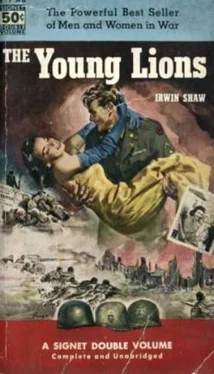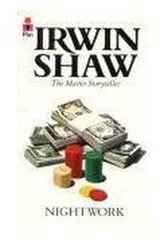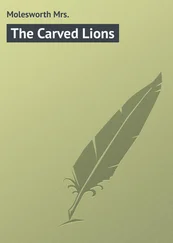Irwin Shaw - The Young Lions
Здесь есть возможность читать онлайн «Irwin Shaw - The Young Lions» весь текст электронной книги совершенно бесплатно (целиком полную версию без сокращений). В некоторых случаях можно слушать аудио, скачать через торрент в формате fb2 и присутствует краткое содержание. Жанр: Классическая проза, на английском языке. Описание произведения, (предисловие) а так же отзывы посетителей доступны на портале библиотеки ЛибКат.
- Название:The Young Lions
- Автор:
- Жанр:
- Год:неизвестен
- ISBN:нет данных
- Рейтинг книги:4 / 5. Голосов: 1
-
Избранное:Добавить в избранное
- Отзывы:
-
Ваша оценка:
- 80
- 1
- 2
- 3
- 4
- 5
The Young Lions: краткое содержание, описание и аннотация
Предлагаем к чтению аннотацию, описание, краткое содержание или предисловие (зависит от того, что написал сам автор книги «The Young Lions»). Если вы не нашли необходимую информацию о книге — напишите в комментариях, мы постараемся отыскать её.
The Young Lions — читать онлайн бесплатно полную книгу (весь текст) целиком
Ниже представлен текст книги, разбитый по страницам. Система сохранения места последней прочитанной страницы, позволяет с удобством читать онлайн бесплатно книгу «The Young Lions», без необходимости каждый раз заново искать на чём Вы остановились. Поставьте закладку, и сможете в любой момент перейти на страницу, на которой закончили чтение.
Интервал:
Закладка:
"Well, Colonel," Michael said, "what has Civil Affairs to say about this?"
Pavone smiled gently at Michael and touched his arm softly, as though he realized, out of his greater age and deep experience, that Michael felt somehow guilty for this and must be forgiven for his sharpness because of it. "I think," he began, "we had better get out of here. The British got this, let them worry about it…"
They passed the convent wall, but the boy from Toronto was gone. Pavone stepped hard on the accelerator and they sped out of town. It was lucky they had not stopped before the convent, because they hadn't gone three hundred yards when they heard the explosion behind them. There was a whirling cloud of dust squarely in the road where they had been.
Pavone turned to look, too. Michael and he glanced at each other. They did not smile and they did not speak. Pavone turned back and hunched over the wheel.
They crossed the marked thousand yards, where the road was under observed shellfire, without incident. Pavone stopped the jeep and signalled for Michael to come up and take the wheel.
As he climbed over the seat Michael halted and looked back. There was no sign that a city, ruined or unruined, lay over the horizon.
He started the jeep, feeling better to be at the wheel, and they drove slowly without speaking through the yellow afternoon sun towards the American lines.
Half a mile further on they saw troops coming up on both sides of the road, in single file, and they heard a strange, skirling noise. A moment later they saw that it was a battalion of infantry, Scotch-Canadian, each company led by a bagpiper, walking slowly towards a road that led off into wheatfields to the left. Other troops could be seen, just their heads and weapons showing above the wheat, marching slowly down towards the river.
The noise of the bagpipes sounded wild and comic and pathetic in the open, deserted country. Michael drove very slowly towards the approaching troops. They were walking heavily, sweating dark stains into their heavy battledress, loaded down with grenades and bandoliers and boxes of machine-gun ammunition. In front of the first Company, just behind the bagpiper, strode the Commanding Officer, a large, red-faced young Captain, with a swooping red moustache. He carried a small swagger-stick and he stepped out strongly in front of his troops, as though the crying, thin music of the pipes were a joyous march.
The officer grinned when he saw the jeep, and waved his swagger-stick. Michael looked past him to the men. Their faces were strained under the sweat, and no one was smiling. Their battledress and equipment were fresh and neat and Michael knew that these men were going into their first battle. They walked silently, already weary, already overburdened, with a blank, wrenched look on their crimson faces, as though they were listening to something, not to the pipes or to the distant rumble of the guns, or the weary scuffle of their boots on the road, but to some inner debate, deep within them, that reached them thinly and to which they had to pay close attention if they wished to catch its meaning.
But as the jeep came abreast of the officer he grinned widely, a twenty-year-old athlete's, white-toothed grin under the ludicrous and charming moustache, and boomed out, in a voice that could be heard for a hundred yards, although the jeep was only five feet from him, "Lovely day, isn't it?"
"Good luck," Pavone said, in the simple, not over-loud, well-modulated tone of the man who is going back from the fighting and can now control his voice, "good luck to you all, Captain." The Captain waved his stick again, in a jerky, friendly gesture, and the jeep slowly rolled past the rest of the Company, brought up at the rear by the MO, with the red crosses on his helmet, and a young, listening, thoughtful look on his face, and the first-aid kits in his hands.
The music of the bagpipes died down into fragile, gull-like echoes as the Company turned off into the wheatfield and wound deeper and deeper into it, like armed men marching purposefully and regretfully into a rustling, golden sea.
Michael woke up, listening to the growing mutter of the guns. He was depressed. He smelled the damp, loamy odour of the foxhole in which he slept, and the acid, dusty smell of the bivouac dark over his head. He lay rigid, in the complete darkness, too tired to move, warm under the blankets, listening to the sound of guns that was coming closer each moment. The usual air raid, he thought, hating the Germans, every goddamn night.
The sound of the guns was very close now and there was the soft deadly hiss of shrapnel falling near-by and the plump, solid sounds as the steel fragments hit the earth. Michael reached in behind him and got his helmet and put it over his groin. He pulled his barracks bag, which was lying next to him in the hole, stuffed with extra pants, vests and shirts, and rolled it on top of him, on his belly and chest. Then he crossed his arms over his head, covering his face with the warm smell of his flesh and the sweaty smell of the long sleeves of the woollen underwear. Now, he thought, as this nightly routine which he had worked out in the weeks in Normandy was completed, now they can hit me. He had figured out the various parts of himself which were most vulnerable and most precious, and they were protected. If he got hit in the legs or arms it would not be so serious.
He lay there, in the complete darkness, listening to the roaring and whistling above his head. He began to feel cosy and protected in the deep hole in which he slept. The inside of the hole was lined with stiff canvas cut from a crashed glider, and he had put down as a ground cloth a luminescent silk signalling panel that gave an air of Oriental luxury to the neat underground establishment.
Michael wondered what time it was, but he was too tired to try to find his flashlight and look at his watch. From three to five in the morning he was to be on guard duty and he wondered dully whether it was worth while to try to go to sleep again.
The raid went on. The planes must be very low, he thought, they're firing machine-guns at them. He listened to the machineguns and to the patient roar of the planes above. How many air raids had he been in? Twenty? Thirty? The Luftwaffe had tried to kill him thirty times, in a general, impersonal way, and had failed.
He played with the idea of being hit. A nice, eight-inch gash in the fleshy part of the leg. With a nice little fracture of the thigh-bone thrown in. Michael thought of himself hobbling bravely up the ramp of Grand Central Station in New York, fully equipped with Purple Heart, crutches and discharge papers.
The guns stopped outside and the planes droned back towards the German lines. Michael slipped the barracks bag off his chest and rolled the helmet away from his groin. Ah, God, he thought, ah, God, how long it this going to last?
Then the guard he was to relieve poked his head into the tent and pulled Michael's toe under the blankets.
"On your feet, Whitacre," said the guard. "You're going for a walk."
"OK, OK," Michael said, pushing back the blankets. He shivered and hurriedly put on his shoes. He put on his field jacket and picked up his carbine, and, shivering badly, stepped out into the night. It had clouded over and a fine drizzle was falling. Michael reached into the tent and got out his raincoat and put it on. Then he went over to the guard, who was leaning against a jeep, talking to another sentry, and said, "All right, go on back to sleep."
He stood leaning against the jeep, next to the other guard, shivering, feeling the drizzle filtering in under his collar and rolling down his face, peering out into the cold wet darkness, remembering all the women he had thought about during the raid, remembering Margaret, and trying to compose a letter, a letter so moving, so tender and heartbreaking and true and loving, that she would see how much they needed each other and would be waiting for him when he got back to the sorrowful, chaotic world of America after the war.
Читать дальшеИнтервал:
Закладка:
Похожие книги на «The Young Lions»
Представляем Вашему вниманию похожие книги на «The Young Lions» списком для выбора. Мы отобрали схожую по названию и смыслу литературу в надежде предоставить читателям больше вариантов отыскать новые, интересные, ещё непрочитанные произведения.
Обсуждение, отзывы о книге «The Young Lions» и просто собственные мнения читателей. Оставьте ваши комментарии, напишите, что Вы думаете о произведении, его смысле или главных героях. Укажите что конкретно понравилось, а что нет, и почему Вы так считаете.











